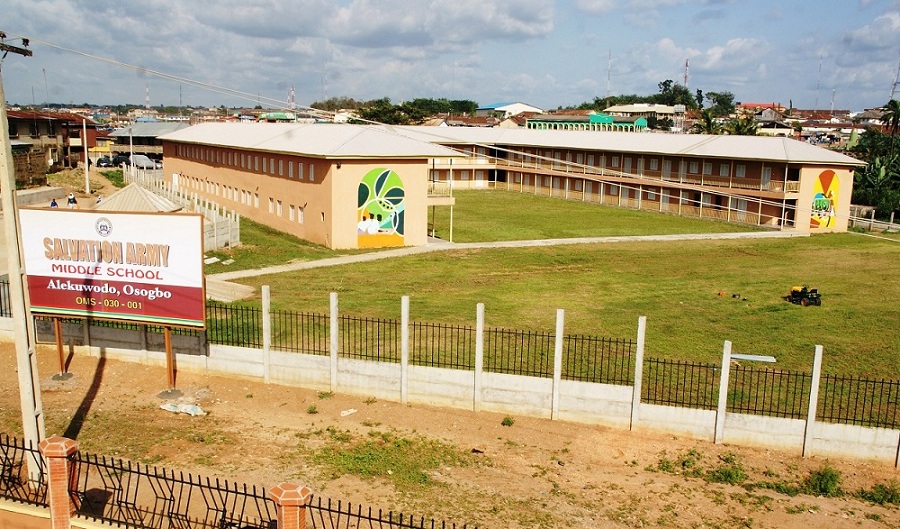
SCHOOL REFORMS: One Month After…Pupils, Teachers Share Their Experiences

A month after the Government of Osun school reclassification programme took off, pupils, teachers, and others narrate their experiences.
The reclassification of schools in Osun State has not stopped to generate reactions. Some stakeholders have criticised the new education policy, while others have described it as a right step in the right direction.
In the first category are some politicians and the Christian Association of Nigeria who see the policy as a means of undermining Christianity. And those in support of the reclassification have also argued that the step would benefit the pupils who would now learn in a more conducive environment with modern facilities.
However, despite these divergent views, things are gradually taken shape in the various institutions. A visit to some of the schools in Osogbo, the state capital, revealed that pupils, in all grade levels, are gradually integrating into the new system. Some hail the new arrangement, while some others are indifferent. Some others say they miss their friends in the former institutions.
Besides, some parents too express mixed feelings on the issue. As a result of the novel ‘marriages’, some pupils now have to travel some kilometres from their residence to the new schools. They are thus asking the state government to provide free transportation for them.
A 10-year-old Grade 6 pupil of Salvation Army Middle School, Alekuwodo, Abduqudri Abu, says the policy is a good one, because according to him, the school is one of the new ones built by the government, which boasts modern facilities. These include well tiled floors, electricity supply with functional ceiling fans, toilets and water.
He says, “I am enjoying this school. It is better than my former school. It is good and every school should be like this one.”
A secondary school pupil who was transferred from Fakunle Comprehensive High School to Baptist Girls High School, Afeez Abdukareem, explains that he does not see anything wrong in attending the same school with girls, because that was what obtained from where he was coming from. He, however, says he misses some of his friends in his former school who have been taken to some other places.
Another female student who refused to give her name at the Baptist Girls High School says she feels indifferent about the merger, because according to her, no male colleague can influence her to do anything against her wish.
She tells our correspondent, “It is somewhat strange to see the boys joining us, but here we have been trained not to entertain distractions from the opposite sex. Even at home, my parents have always drummed it into my ears, not to be deceived by the opposite sex. So, personally, there is no problem with me.”
Some parents also air their views. Mr. Ade Adeniyi, whose children are attending St. Michael’s C&S Elementary School, wants the Aregbesola administration to provide free buses to transport pupils, stressing that this measure will eliminate the problem of distance which some pupils are facing.
He says, “Though the education policy is good, some things were not considered before it was introduced. And one of them is the distance. Some pupils now have to travel some kilometres before getting to their new school. This is an additional burden on the parents’ hard-earned resources.”
Another parent, Mrs. Omolade Oni, says she sees nothing wrong with having boys being taken to girls school, because, according to her, there is no gender that exist only on their own in the society.
She states, “I went to a mixed secondary school, and I never allowed any distraction from either boys or any other area. I don’t think there is a gender that exists alone in the society.”
But some teachers who were taken to places farther from their former schools lament the merger, saying it was stressful.
The teachers who do not want their names mentioned for fear of possible persecution say they ought to have been consulted before the ‘indiscriminate transfers’ to avoid the problem they are now encountering.
Yet, a national officer of ANCOPSS who is a principal of one of the schools supports the merger. He notes that the policy would afford the government the opportunity to maximise the little resources available. He warns that the policy must be properly implemented to avoid failure.
The state government has however continued to stress that the new education policy is a product of the education summit it organised when it took over the administration of the state.
The Nobel laureate, Prof. Wole Soyinka, was one the personalities at the summit . The government says Soyinka gave his nod to the reclassification model.
Under the reclassification of public schools, pupils from age six to nine years are grouped together in elementary schools. Those who are six years old are supposed to be in Grade 1 while the elementary school ends at Grade 4, after which the pupils proceed to Middle School where they would spend five years from Grade 5 to Grade 9.
At High School, the pupils will spend three years from Grade 10 to Grade 12 after which they would write the final examinations.
The deputy governor, Mrs. Titi Laoye-Tomori, who also oversees the education ministry, says since the introduction of the new policy, school enrolment had soared as some parents have begun to withdraw their children from private schools to public schools in the state.
She says, “The implementation of this reform in the reclassified structure of the schools will ensure a total overhauling and the revamping of the educational system.
“These schools are to be neighbourhood schools, not to be too far from area of residence, trade and work place of parents. The middle school will have students in Grades 5-9 classes; age range of 10-14 years are to be sited within maximum of two to three kilometres from where pupils live and the high school will have students in Grades 10-12 classes – age range of 15-17years.”
Laoye-Tomori adds that the state government has provided a level playing ground in these schools.
“We have provided a level playing ground for our children in the state, irrespective of their family background. The kids see themselves as one. Aside from infrastructure and the feeding programme, government has given free uniforms to students many of who, before now, were badly clad.”
While she argues that it is more economical to cater for 300 pupils in one school than in three schools of 100 pupils each, she hints that the erstwhile school system in the state has schools with as low as 30 pupils as total enrolment in primaries one to six.
She agrees that some classes have more than 40 pupils now because of the ongoing construction of new bigger schools which would replace the dilapidated ones. Laoye-Tomori also allays the fear in some quarters that the reclassification would lead to sacking of teachers. She adds that the state government has recruited 14,890 teachers to tackle the shortage of personnel in public schools.
THE PUNCH



